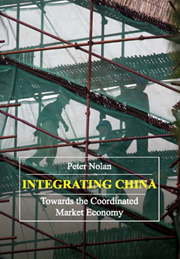Book contents
- Frontmatter
- Contents
- Acknowledgements
- Foreword
- 1 Reflections on 4th June 1989
- 2 The Global Business Revolution and Developing Countries
- 3 The Globalisation Challenge and the Catch-up of Developing Countries: The Case of the Brewing Industry
- 4 The Global Industrial Consolidation and the Challenge for China: The Case of the Steel Industry
- 5 China in the Asian Financial Crisis: ‘Cutting the Trees to Save the Forest’
- 6 China at the Crossroads
- 7 Capitalism and Freedom: The Contradictory Character of Globalisation
- 8 Capitalism, Conflict and Cooperation: US-China Relations under Capitalist Globalisation
- Index
6 - China at the Crossroads
Published online by Cambridge University Press: 05 March 2012
- Frontmatter
- Contents
- Acknowledgements
- Foreword
- 1 Reflections on 4th June 1989
- 2 The Global Business Revolution and Developing Countries
- 3 The Globalisation Challenge and the Catch-up of Developing Countries: The Case of the Brewing Industry
- 4 The Global Industrial Consolidation and the Challenge for China: The Case of the Steel Industry
- 5 China in the Asian Financial Crisis: ‘Cutting the Trees to Save the Forest’
- 6 China at the Crossroads
- 7 Capitalism and Freedom: The Contradictory Character of Globalisation
- 8 Capitalism, Conflict and Cooperation: US-China Relations under Capitalist Globalisation
- Index
Summary
[T]he disparity between our technology and our ethics is greater than it has ever been. [This] is mortally dangerous…[I]n spite of his scientific and technological prowess, modern man, like primitive man, is not the master of the situation in which he finds himself. He has failed to master it because he has failed to master himself…The individual self is alienated from the universal self by greed. This greed is a desire to exploit the universal for the individual self's purposes. The converse of greed is compassion. By practising compassion, the individual self can become the universal self actually…If mankind is not to destroy itself, it must now cleanse the pollution it has produced and must refrain from producing any more. [T]his can only be by co-operation on a world-wide scale…Unrestrained greed is self-destructive because it takes suicidally short views…[I]n all industrial countries in which maximum private profit is the motive for production, the competitive economic system will become unworkable. [T]he survival of mankind is more precarious today than it has been at any time since mankind established its ascendancy over non-human nature…[T]he human race will be unable to survive unless it achieves political unification quickly. It is conceivable that the future unifier of the world will not be a Western or a Westernised country but will be China…[F]or most of the time since the third century BC, [China] has been the centre of the world. Within the last five hundred years, the whole world has been knitted together by Western enterprise all except on the political plane. […]
- Type
- Chapter
- Information
- Integrating ChinaTransition into Global Economy, pp. 145 - 176Publisher: Anthem PressPrint publication year: 2007

